1988 PONTIAC FIERO oil temperature
[x] Cancel search: oil temperaturePage 1405 of 1825
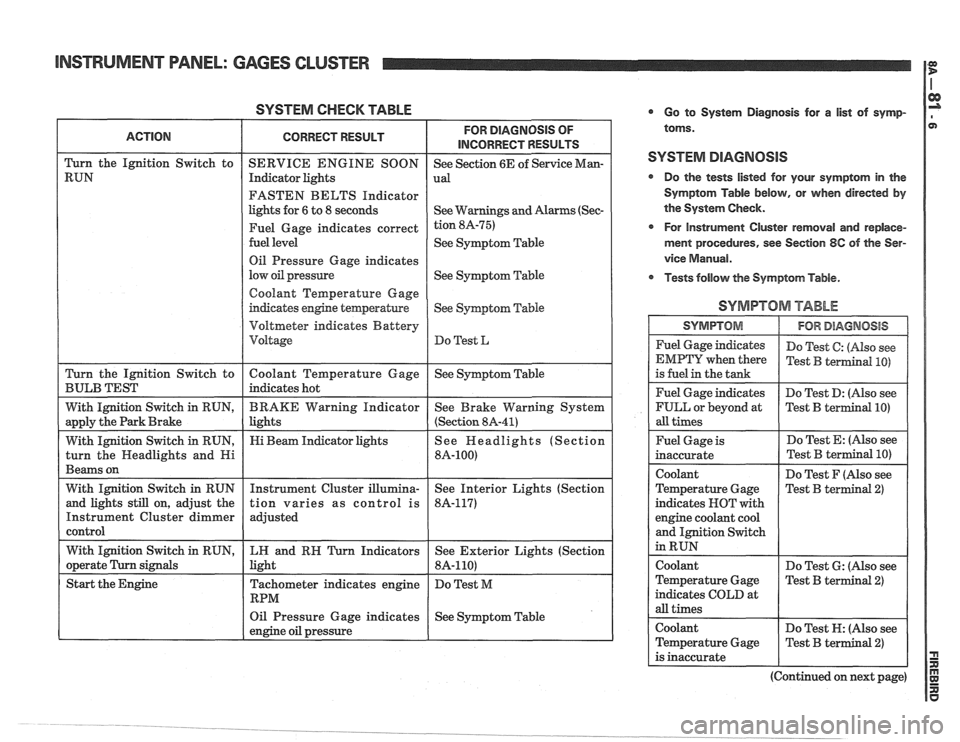
SYSTEM CHECK TABLE
FASTEN BELTS Indicator
lights for
6 to 8 seconds
See
Symptom Table
Oil Pressure Gage indicates
See
Syqtom Table
Coolant Temperature Gage
Voltmeter indicates Battery
Oil Pressure Gage indicates
See Symptom Table
engine oil pressure
L
Go to System Diagnosis for a list of symp-
toms.
SYSTEM DIAGNOSIS
Do the tests listed for your symptom in the
Symptom Table below, or when directed
by
the System Check.
r For Instrument Cluster removal and replace-
ment procedures, see Section
8C of the Ser-
vice
Manual.
Tests follow the Symptom Table.
SYMPTOM TABLE
I SYMPTOM 1 IFORDlAGMOSlS I
Fuel Gage indicates
EMPTY when there
is fuel in the tank
Fuel Gage indicates
FULL or beyond at
all times Do
Test
C: (Also see
Test
B terrnind PO)
Do Test D: (Nso see
Test
B terIllinal PO)
Fuel Gage is
inaccurate
Coolant
Temperature Gage
indicates NOT with
engine coolant cool
and Ignition Switch
in RUN Do
Test E: (Also see
Do Test F (Also see
Test B terminal
2)
coolant
Temperature Gage
indicates COLD at
all times Do
Test
6: (Also see
Test
B terminal 2)
Coolant Do Test N: (Also see
Temperature Gage
Test
B terminal 2)
is inaccurate
(Continued on next page)
Page 1406 of 1825
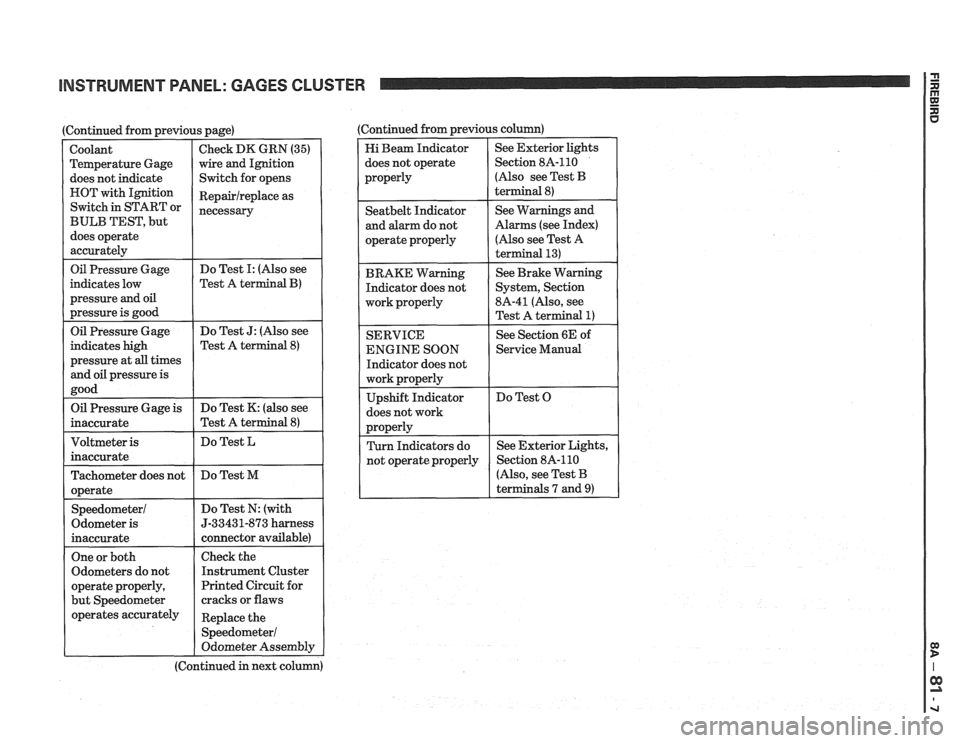
INSTRUMENT PANEL: GAGES CLUSTER
I Oil Pressure Gage
(Continued from previous page)
indicates low
pressure
and oil
pressure is good
Coolant
Temperature Gage
does not indicate
HOT with Ignition
Switch in START or
BULB TEST, but
does operate
accurately
Do Test I: (Also see
Test A
terminal B)
Check DK GRN (35)
wire and Ignition
Switch for opens
Repairlreplace as
necessary
Oil Pressure Gage
indicates high
pressure at
all times
and oil pressure is
good Do
Test
J: (Also see
Test A terminal
8)
Oil Pressure Gage is
inaccurate Do
Test K: (also see
Test A terminal
8)
Do Test L
Tachometer does not
operate
Speedometer1
Odometer is
inaccurate Do
Test M
Do Test N: (with
5-33431-873 harness
connector available)
One or both
Odometers do not
operate properly,
but Speedometer
operates accurately
I
Check the
Instrument Cluster
Printed Circuit for
cracks or flaws
Replace the
Speedometer1
Odometer Assembly
(Continued in next column) (Continued from previous
column)
Hi Beam Indicator
does not operate
properly See
Exterior lights
Section 8A-110
(Also see Test
B
terminal 8)
I operate properly
I
(Also see Test A
I
Seatbelt Indicator
and alarm do not
BRAKE Warning Indicator does not
work properly
I
See Warnings and
Alarms (see Index)
SERVICE
ENGINE SOON
Indicator does not
does not work See
Brake Warning
System, Section
8A-41 (Also, see
Test A terminal
1)
See Section 6E of
1 Service Manual
Do Test O
r
(Also, see Test B
terminals 7 and
9)
Page 1411 of 1825
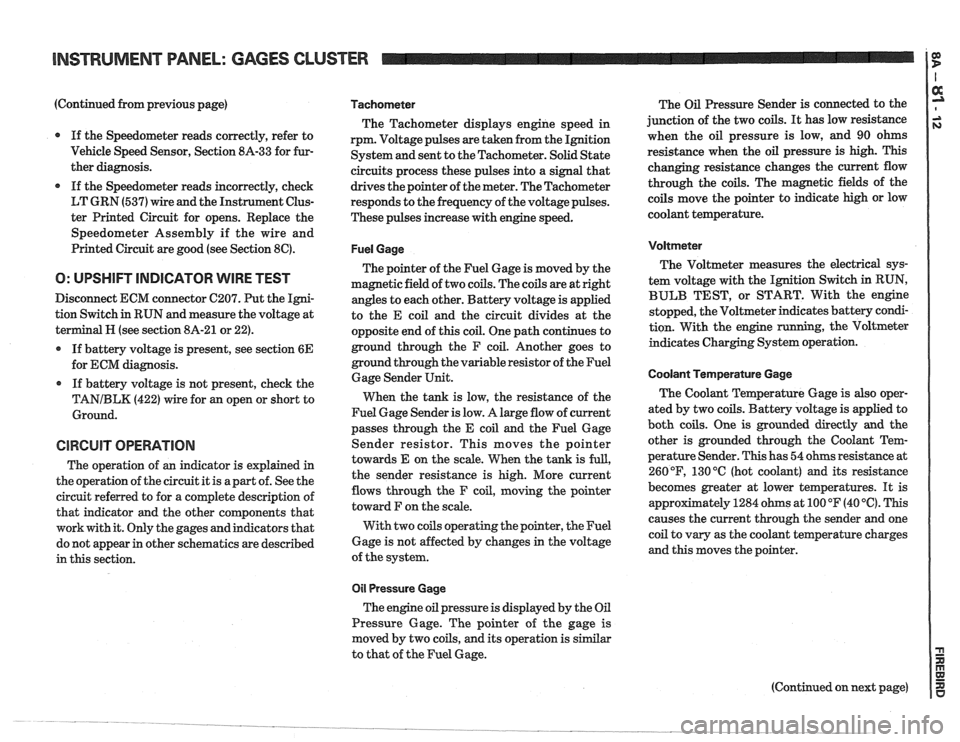
(Continued from previous page)
If the Speedometer reads correctly, refer to
Vehicle Speed Sensor, Section
8A-33 for fur-
ther diagnosis.
If the Speedometer reads incorrectly, check
LT GRN (537) wire and the Instrument Clus-
ter Printed Circuit for opens. Replace the
Speedometer Assembly if the wire and
Printed Circuit are good (see Section
8C).
O: UPSHIFT INDICATOR WIRE TEST
Disconnect ECM connector C207. Put the Igni-
tion Switch in RUN and measure the voltage at
terminal
H (see section 8A-21 or 22).
If battery voltage is present, see section
6E
for ECM diagnosis.
If battery voltage is not present, check the
TANIBLK (422) wire for an open or short to
Ground.
CIRCUIT OPERATION
The operation of an indicator is explained in
the operation of the circuit it is apart of. See the
circuit referred to for a complete description of
that indicator and the other components that
work with it. Only the gages and indicators that
do not appear in other schematics are described
in this section.
Tachometer
The Tachometer displays engine speed in
rpm. Voltage pulses are taken from the Ignition
System and sent to the Tachometer. Solid State
circuits process these pulses into a signal that
drives the pointer of the meter. The Tachometer
responds to the frequency of the voltage pulses.
These pulses increase with engine speed.
Fuel Gage
The pointer of the Fuel Gage is moved by the
magnetic field of two coils. The coils are at right
angles to each other. Battery voltage is applied
to the E coil and the circuit divides at the
opposite end of this coil. One path continues to
ground through the F coil. Another goes to
ground through the variable resistor of the Fuel
Gage Sender Unit.
When the tank is low, the resistance of the
Fuel Gage Sender is low. A large flow of current
passes through the E coil and the Fuel Gage
Sender resistor. This moves the pointer
towards E on the scale. When the tank is
full,
the sender resistance is high. More current
flows through the F coil, moving the pointer
toward F on the scale.
With two coils operating the pointer, the Fuel
Gage is not affected by changes in the voltage
of the system.
011 Pressure Gage
The engine oil pressure is displayed by the Oil
Pressure Gage. The pointer of the gage is
moved by two coils, and its operation is similar
to that of the Fuel Gage. The
Oil Pressure Sender is connected to the
junction of the two coils.
It has low resistance
when the oil pressure is low, and 90 ohms
resistance when the oil pressure is high. This
changing resistance changes the current flow
through the coils. The magnetic fields of the
coils move the pointer to indicate high or low
coolant temperature.
Voltmeter
The Voltmeter measures the electrical sys-
tem voltage with the Ignition Switch in RUN,
BULB TEST, or START. With the engine
stopped, the Voltmeter indicates battery condi-
tion. With the engine
running, the Voltmeter
indicates Charging System operation.
Coolant Temperature Gage
The Coolant Temperature Gage is also oper-
ated by two coils. Battery voltage is applied to
both coils. One is grounded directly
and the
other is grounded through the Coolant Tem-
perature Sender. This has 54 ohms resistance at
260
OF, 130 "C (hot coolant) and its resistance
becomes greater at lower temperatures. It is
appr~ximately 1284 ohms at 100 OF (40 '6). This
causes the current through the sender and one
coil to vary as the coolant temperature charges
and this moves the pointer.
Page 1420 of 1825
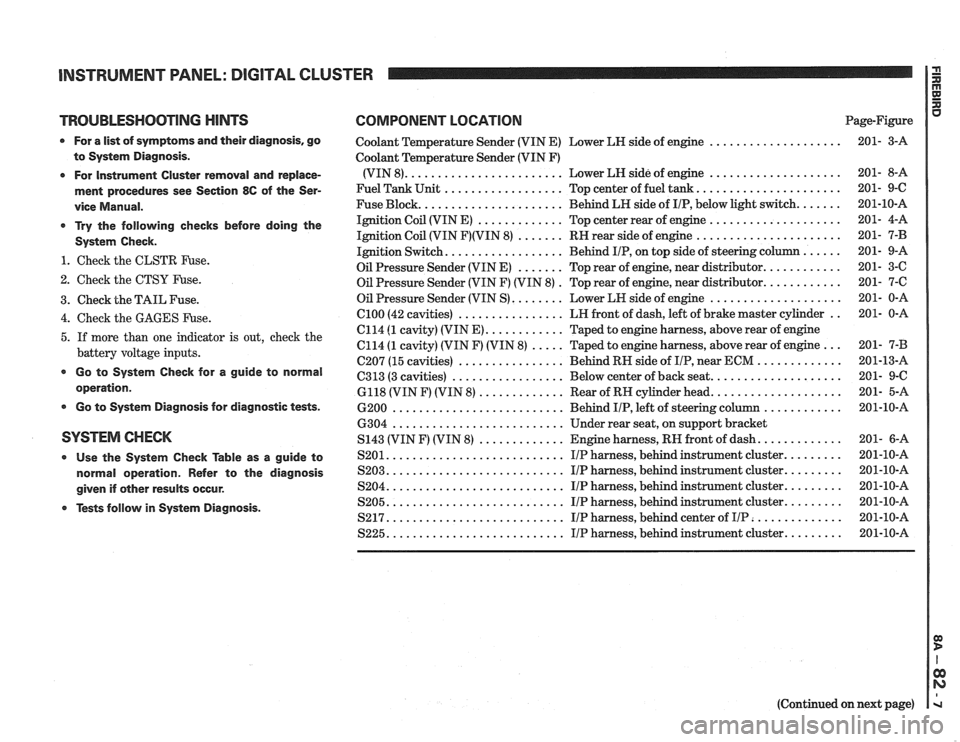
INSTRUMENT PANEL: DIGITAL CLUSTER a
TROUBLESHOOTING HINTS COMPONENT LOCATION u Page-Figure
0 For a list of symptoms and their diagnosis. go
to System Diagnosis
.
0 For Instrument Cluster removal and replace-
ment procedures see Section
86 of the Ser-
vice Manual
.
* Try the following checks before doing the
System Check
.
1 . Check the CLSTR Fuse .
2 . Check the CTSY Fuse .
3 . Check the TAIL Fuse .
Coolant Temperature Sender (VIN E) Lower LH side of engine ....................
Coolant Temperature Sender (VIN F)
(VIN 8)
........................ Lower LH side of engine ....................
Fuel Tank Unit .................. Top center of fuel tank ......................
Fuse Block ...................... Behind LH side of IIP. below light switch .......
Ignition Coil (VIN E) ............. Top center rear of engine ....................
Ignition Coil (VIN F)(VIN 8) ....... RH rear side of engine ......................
Ignition Switch .................. Behind IIP. on top side of steering column ......
Oil Pressure Sender (VIN E) ....... Top rear of engine. near distributor ............
Oil Pressure Sender (VIN F) (VIN 8) . Top rear of engine. near distributor ............
Oil Pressure Sender (VIN S) ........ Lower LH side of engine ....................
................ .. 4 . Check the GAGES Fuse . el00 (42 cavities) LH
front of dash. left of brake master cylinder 201- 0-A
C114
(1 cavity) (VIN E) ............ Taped to engine harness. above rear of engine
5 . If more than one indicator is out. check the C114 (1 cavity) (VIN F) (VIN 8) ..... Taped to engine harness. above rear of engine ... 201- 7-B
battery voltage inputs . . C207 (15 cavities) ................ Behind RH side of IIP near ECM ............. 201-13-A
................. .................... * Go to System Check for a guide to C313 (3 cavities) Below
center of back seat 201- 9-C operation . 6118 (VIN F) (VIN 8) ............. Rear of RH cylinder head .................... 201- 5-A
0 Go to System Diagnosis for diagnostic tests . 6200 .......................... Behind IIP. left of steering column ............ 201-10-A
6304
.......................... Under rear seat. on support bracket
SYSTEM CHECK S143 (VIN F) (VIN 8) ............. Engine harness. RH front of dash ............. 201- 6-A
0 Use the System Check able as a guide to S201 ........................... IIP harness. behind instrument cluster ......... 201-10-A
normal operation . Refer to the diagnosis S203 ........................... I/P harness. behind instrument cluster ......... 201-10-A
........................... ......... given if other results occur . S204 IIP harness. behind instrument cluster 201-10-A
........................... ......... Tests follow in System Diagnosis . S205 IIP harness. behind instrument cluster 201-10-A
S217 ........................... IIP harness. behind center of IIP .............. 201-10-A
S225 ........................... IIP harness. behind instrument cluster ......... 201-10-A
(Continued on next page)
Page 1421 of 1825
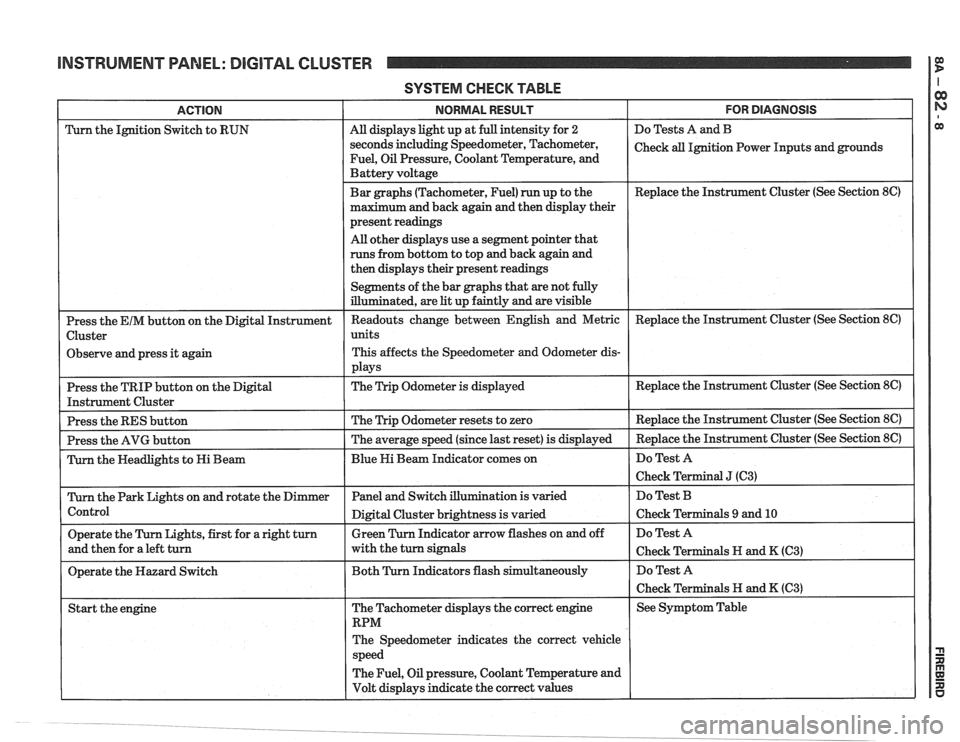
INSTRUMENT PANEL: DIGITAL CLUSTER 1 fE!
SYSTEM CHECK TABLE
FOR DIAGNOSIS
Do Tests A and B
Check
all Ignition Power Inputs and grounds
Replace the Instrument Cluster (See Section
8C)
ACTION
Turn the Ignition Switch to RUN
Observe and press it again
Replace the Instrument Cluster (See Section
8C)
The Speedometer indicates the correct vehicle
The Fuel, Oil pressure, Coolant Temperature and
Volt displays indicate the correct values I I I
NORMAL RESULT
All displays light up at full intensity for 2
seconds including Speedometer, Tachometer,
Fuel, Oil Pressure, Coolant Temperature, and
Battery voltage
Bar graphs (Tachometer, Fuel) run up to the
maximum and back again and then display their
present readings
All other displays use a segment pointer that
runs from bottom to top and back again and
then displays their present readings
Segments of the bar graphs that are not fully
illuminated, are
lit up faintly and are visible
Page 1422 of 1825
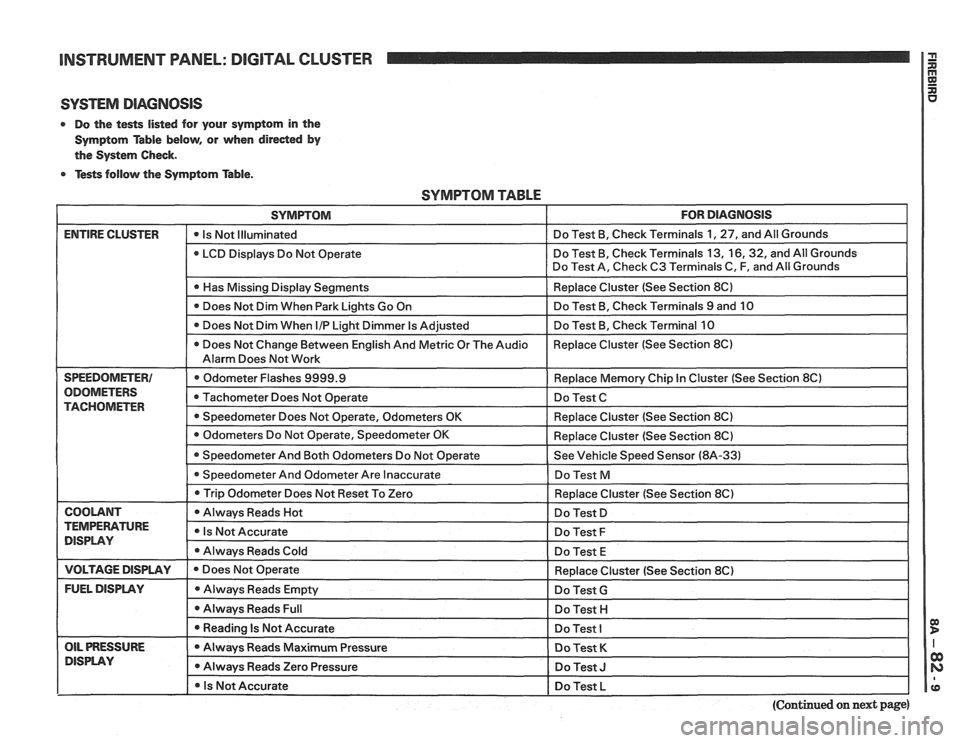
INSTRUMENT PANEL: DlGlTAL CLUSTER a
SYSTEM DIAGNOSIS
0 Do the tests listed for your symptom in the
Symptom Table below, or when
direded by
the System Check.
0 Tests follow the Symptom Table.
SYMPTOM TABLE
SYMPTOM FOR DIAGNOSIS
ENTIRE CLUSTER - -
0 Is Not Illuminated Do
Test B, Check Terminals 1, 27, and All Grounds
LCD Displays Do Not Operate Do
Test B, Check Terminals 13,
16,32, and All Grounds
Do Test A, Check C3 Terminals C, F, and All Grounds
I 0 Has Missing Display Senments I Replace Cluster (See Section 8C) I
Does Not Dim When Park Lights Go On Do
Test B, Check Terminals 9 and 10
Does Not Dim When
I/P Light Dimmer Is Adjusted Do
Test B, Check Terminal 10
0 Does Not Change Between English And Metric Or The Audio Replace
Cluster (See Section 8C)
Alarm Does Not Work
SPEEDOMETER1 Odometer Flashes 9999.9 Replace Memory Chip In Cluster (See Section 8Cl
ODOMETERS Tachometer Does Not Operate Do Test C TACHOMETER 0 Speedometer Does Not Operate, Odometers OK Replace Cluster (See Section 8C)
I 0 Trip Odometer Does ~otReset To Zero I Redace Cluster (See Section 8C) I
I COOLANT I 0 Always Reads Hot I Do Test D I
TEMPERATURE Is Not Accurate DISPLAY Do Test F
Always Reads Cold
Do Test E
I VOLTAGE DISPLAY I e Does Not Operate
FUEL DISPLAY Always Reads Empty
0 Always Reads Full
I 0 Reading Is Not Accurate - --
OIL PRESSURE Always Reads Maximum Pressure
DlSPLAV 0 Always Reads Zero Pressure
I 0 Is Not Accurate Replace
Cluster (See Section 8C)
Do Test
G
Do Test H I
Do Test I
Do Test K
Do Test J I
Do Test L I pp
(Continued on next page)
Page 1426 of 1825
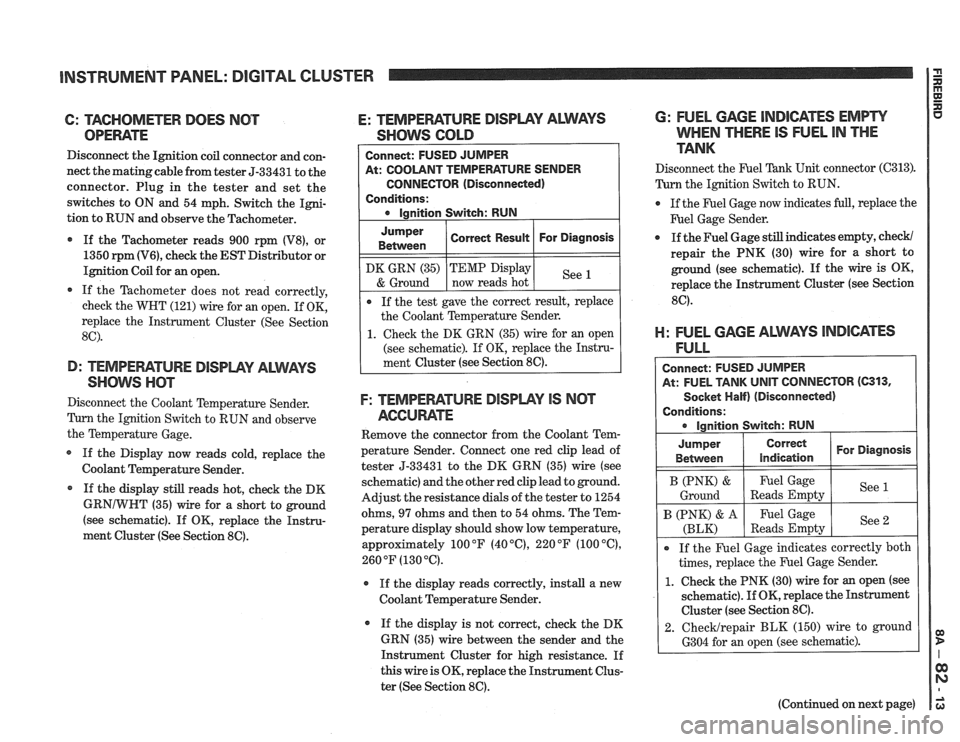
INSTRUMENT PANEL: DIGITAL CLUSTER
6: TAGHOMETER DOES NOT
OPEWTE
Disconnect the Ignition coil connector and con-
nect the matingcable from tester 5-33431 to the
connector. Plug in the tester and set the
switches to ON and 54 mph. Switch the Igni-
tion to RUN and observe the Tachometer.
If the Tachometer reads 900 rpm
(V8), or
1350
rpm (V6), check the EST Distributor or
Ignition Coil for an open.
If the Tachometer does not read correctly,
check the WHT (121) wire for an open. If OK,
replace the Instrument Cluster (See Section
8C).
D: TEMPEFIATURE DISPWY ALWAYS
SHOW nm
Disconnect the Coolant Temperature Sender.
Tum the Ignition Switch to RUN and observe
the Temperature Gage.
If the Display now reads cold, replace the
Coolant Temperature Sender.
* If the display still reads hot, check the DK
GRNIWHT (35) wire for a short to ground
(see schematic). If
OK, replace the Instru-
ment Cluster (See Section
86).
E: TEMPEFIATURE DISPLPIY ALMS
SHOWS GOLD
At: COOLANT TEMPERATURE SENDER
CONNECTOR (Disconnected)
Conditions:
Jumper
Between
F: TEMPEWTURE DISPWY IS NCIT
AGCUME
Remove the connector from the Coolant Tem-
perature Sender. Connect one red clip lead of
tester 5-33431 to the DK GRN (35) wire (see
schematic) and the other red clip lead to ground.
Adjust the resistance dials of the tester to 1254
ohms,
97 ohms and then to 54 ohms. The Tem-
perature display should show low temperature,
approximately 100
OF (40 "C), 220 OF (100 "C),
260 OF (130 "6).
r If the display reads correctly, install a new
Coolant Temperature Sender.
If the display is not correct, check the DK
GRN (35) wire between the sender and the
Instrument Cluster for high resistance. If
this wire is OK, replace the Instrument Clus-
ter (See Section
8C).
DK GRN (35)
& Ground
6: FUEL GAGE INDICATES EMPW
WHEN THERE IS FUEL IN THE
TANK
Correct Result
Disconnect the F'uel Tank Unit connector (C313).
Turn the Ignition Switch to RUN.
For Diagnosis
If the test gave the correct result, replace
the Coolant Temperature Sender.
1. Check the DK GRN (35) wire for an open
(see schematic). If OK, replace the Instru-
ment Cluster (see Section
8C).
TEMP Display
now reads hot
@ If the Fuel Gage now indicates full, replace the
F'uel Gage Sender.
See
a If the Fuel Gage still indicates empty, check/
repair the PNK (30) wire for a short to
ground (see schematic). If the wire is OK,
replace the Instrument Cluster (see Section
8C).
El: FUEL GAGE ALWAYS lNDl6ATES
FULL
Connect: FUSED JUMPER
At: FUEL TANK
UNIT CONNECTOR (C313,
Socket Half) (Disconnected)
Conditions: ignition Switch: RUN
I B (PNK) & I Fuel Gage I See (
Ground Reads Empty
Jumper
Between
If the Fuel Gage indicates correctly both
times, replace the Fuel Gage Sender.
1. Check the PNK (30) wire for an open (see
schematic).
If OK, replace the Instrument
Cluster (see Section
8C).
2. ChecMrepair BLK (150) wire to ground
6304 for an open (see schematic).
Correct
indication
B (PNK) & A
(BLK)
(Continued on next page)
For Diagnosis
Fuel Gage
Reads Empty See
2
Page 1428 of 1825
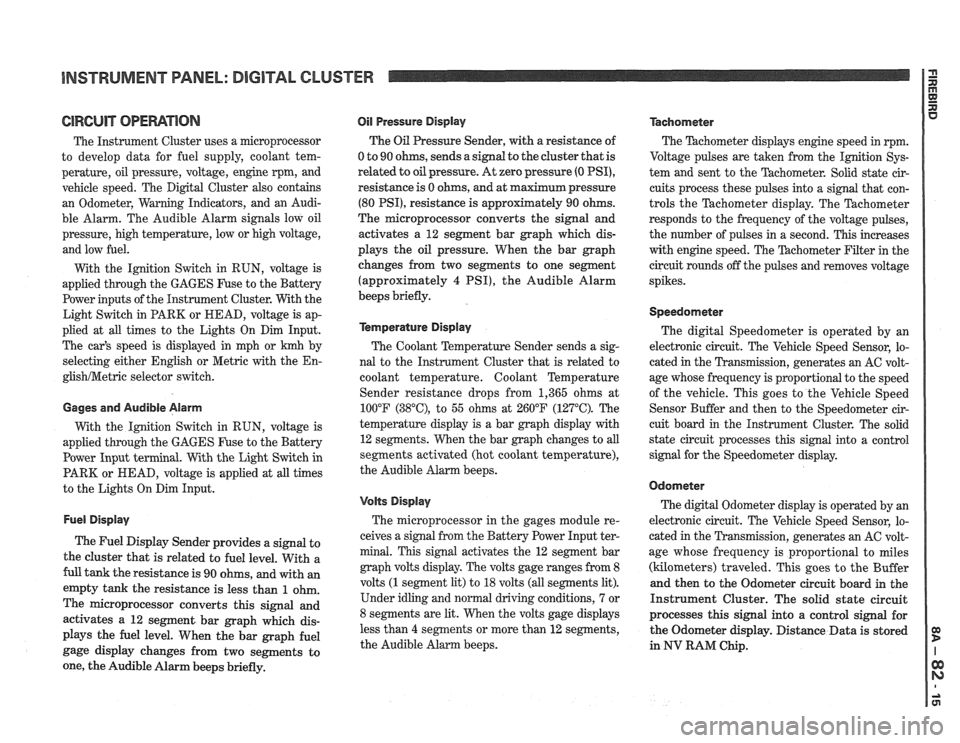
INSTRUMENT PANEL: DIGITAL CLUSTER n 23 rn E
ClRCUlT OPERATION
The Instrument Cluster uses a microprocessor
to develop data for fuel supply, coolant tem-
perature, oil pressure, voltage, engine rpm, and
vehicle speed. The Digital Cluster also contains
an Odometer, Warning Indicators, and an Audi-
ble Alarm. The Audible Alarm signals low oil
pressure, high temperature, low or high voltage,
and low fuel.
With the Ignition Switch in RUN, voltage is
applied through the GAGES Fuse to the Battery
Power inputs of the Instrument Cluster. With the
Light Switch in PARK or HEAD, voltage is ap-
plied at all times to the Lights On Dim Input.
The car's speed is displayed in mph or
krnh by
selecting either English or Metric with the
En-
glishNetric selector switch.
Gages and Audible Alarm
With the Ignition Switch in RUN, voltage is
applied through the GAGES Fuse to the Battery
Power Input terminal. With the Light Switch in
PARK or HEAD, voltage is applied at all times
to the Lights On Dim Input.
Fuel Display
The Fuel Display Sender provides a signal to
the cluster that is related to fuel level. With a
full tank the resistance is 90 ohms, and with an
empty tank the resistance is less than
1 ohm.
The microprocessor converts this signal and
activates a 12 segment bar graph which dis-
plays the fuel level. When the bar graph fuel
gage display changes from two segments to
one, the Audible Alarm beeps briefly.
Oil Pressure Display
The Oil Pressure Sender, with a resistance of
0 to 90 ohms, sends a signal to the cluster that is
related
to oil pressure. At zero pressure (0 PSI),
resistance is 0 ohms, and at maximum pressure
(80 PSI), resistance is approximately 90 ohms.
The microprocessor converts the signal and
activates a 12 segment bar graph which dis-
plays the oil pressure. When the bar graph
changes from two segments to one segment
(approximately
4 PSI), the Audible Alarm
beeps briefly.
kmperature Display
The Coolant Temperature Sender sends a sig-
nal to the Instrument Cluster that is related to
coolant temperature. Coolant Temperature
Sender resistance drops from 1,365 ohms at
100°F
(38"C), to 55 ohms at 260°F (127°C). The
temperature display is a bar graph display with
12 segments. When the bar graph changes to all
segments activated (hot coolant temperature),
the Audible Alarm beeps.
Volts Display
The microprocessor in the gages module re-
ceives a signal from the Battery Power Input ter-
minal. This signal activates the 12 segment bar
graph volts display. The volts gage ranges from 8
volts
(1 segment lit) to 18 volts (all segments lit).
Under idling and normal driving conditions, 7 or
8 segments are lit. When the volts gage displays
less than
4 segments or more than 12 segments,
the Audible Alarm beeps.
Tachometer
The Thchometer displays engine speed in rpm.
Voltage pulses are taken from the
Ignition Sys-
tem and sent to the Tachometer. Solid state cir-
cuits process these pulses into a signal that con-
trols the Tachometer display. The Tachometer
responds to the frequency of the voltage pulses,
the number of pulses in a second. This increases
with engine speed. The
'Pdchometer Filter in the
circuit rounds off the pulses and removes voltage
spikes.
Speedometer
The digital Speedometer is operated by an
electronic circuit. The Vehicle Speed Sensor, lo-
cated in the Transmission, generates an AC volt-
age whose frequency is proportional to the speed
of the vehicle. This goes to the Vehicle Speed
Sensor Buffer and then to the Speedometer cir-
cuit board in the Instrument Cluster. The solid
state circuit processes this signal into a control
signal for the Speedometer display.
Odometer
The digital Odometer display is operated by an
electronic circuit. The Vehicle Speed Sensor, lo-
cated in the Transmission, generates an
AC volt-
age whose frequency is proportional to miles
(kilometers) traveled. This goes to the Buffer
and then to the Odometer circuit board in the
Instrument Cluster. The solid state circuit
processes this signal into a control signal for
the Odometer display. Distance Data is stored
in
NV RAM Chip.